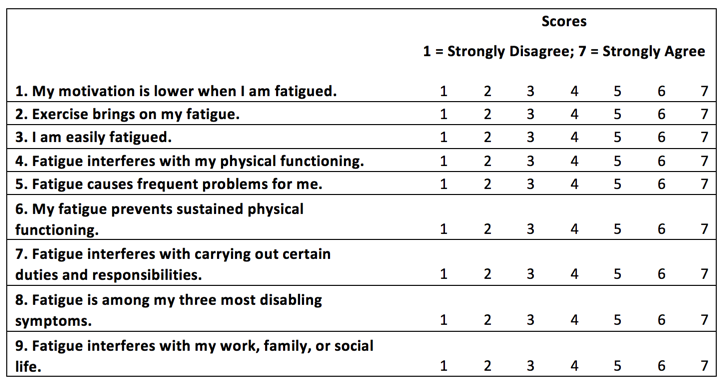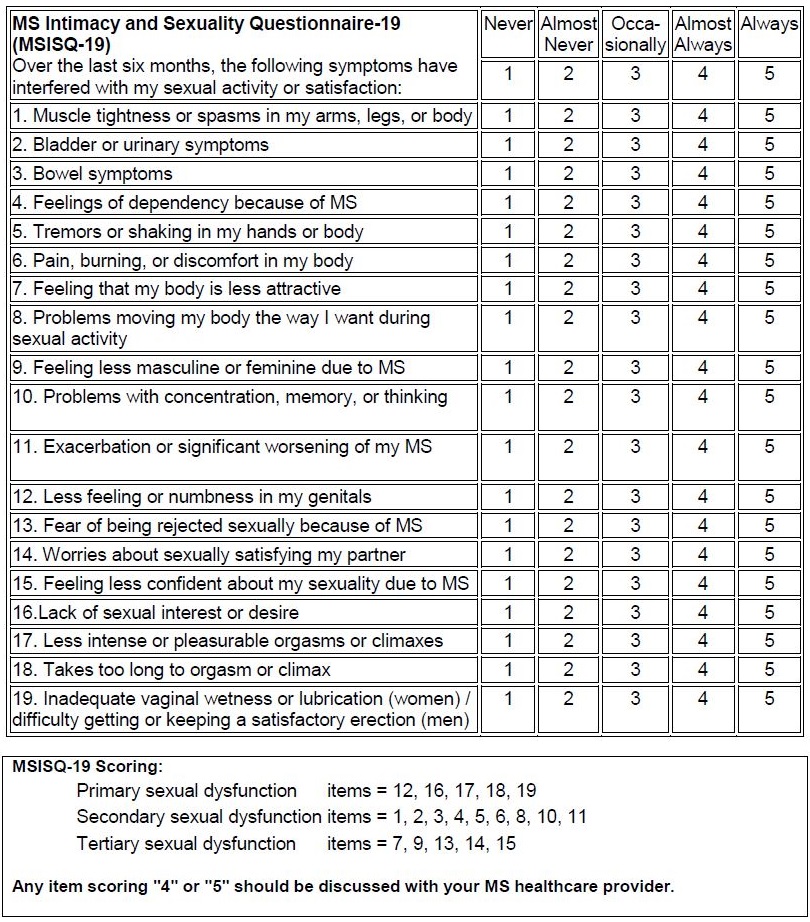Attention A T users. To access the menus on this page please perform the following steps.
1. Please switch auto forms mode to off.
2. Hit enter to expand a main menu option (Health, Benefits, etc).
3. To enter and activate the submenu links, hit the down arrow.
You will now be able to tab or arrow up or down through the submenu options to access/activate the submenu links.
Locator
Contact
Search
VA »
Health Care »
Multiple Sclerosis Centers of Excellence
» Professionals » Diagnosis
»
Self-Report Questionnaires: Fatigue and Sexual Function
Multiple Sclerosis Centers of Excellence
Self-Report Questionnaires: Fatigue and Sexual Function
Heidi Maloni, PhD, APRN, BC-ANP, CNRN, MSCN -- Washington, DC
Patient reported outcomes or PROs are important to clinical care and research settings as they capture the patient’s, unbiased, self-reported outcomes of their quality of life, symptoms, general health, and well-being. A PRO is defined as "any report of the status of a patient’s health condition that comes directly from the patient, without interpretation of the patient’s response by a clinician or any-one else". PROs are used to measure a person’s perception of his/her own experiences and understanding of events. The purpose is to help individuals evaluate their health, emotions, and/or experiences. The self-report evaluations can help people organize their experiences in a more meaningful way that can be shared with their health care providers. The reports create an opportunity to communicate sensitive topics with health care providers in a less threatening manner. Health care providers can then review the self-assessments with their patients and if needed provide appropriate medical interventions.
There are several PRO questionnaires that are directly related to helping people with MS evaluate their condition and experiences. The Fatigue Severity Scale (FSS) and the MS Intimacy and Sexuality Questionnaire-19 (MSISQ-19) are two examples of self-report surveys that can help people with MS evaluate their levels of disease experiences. The results can then be shared with health care providers to help manage disease symptoms of MS. This document contains these two self-report questionnaires.
Fatigue Severity Scale
Fatigue is a common symptom experienced by people with MS. Some studies indicate that fatigue affects approximately 85% of the MS population and nearly 66% of this population experiences it daily. The Fatigue Severity Scale (FSS) was developed by Lauren Krupp, MD, a neurologist who specializes in MS, to address this overwhelming MS symptom. She and her colleagues designed a self-report survey that patients could complete and bring to appointments that would help providers in recognizing and diagnosing fatigue related symptoms of MS.
The self-report questionnaire is a 9-question survey that takes approximately 5 minutes to complete and score. This short survey can provide a wealth of clinical information on the severity of fatigue symptoms. The questionnaire addresses fatigue symptoms as they relate to physical functioning, exercise and work, and family or social life. The scoring is based on a scale ranging from 1 (strongly disagree with the statement) to 7 (strongly agree with the statement). The results are easy to score. The score is based upon an average of the responses to the questions (add up the circled number from each question and then divide by nine). The final number can then be compared to other diseases that are associated with fatigue. The final score is a good indicator of how each person rates their level of fatigue. This information should be shared with health care providers so appropriate interventions can be made.
Intimacy and Sexuality Questionnaire-19
The effects of MS on intimacy and sexual functioning are a common problem. This problem affects nearly 91% of men and 80% of women who have MS. In addition to the problems of sexual dysfunction there tends to be a problem of sharing this concern with health care providers. To address this sensitive topic and to open dialog between people with sexual function problems and their healthcare providers, Frederick Foley, PhD and Audrey Sanders, PhD developed a self-report questionnaire for patients. Drs. Foley and Sanders and their colleagues designed a 19 question self-report survey that people with MS could complete and then bring to their health care provider. The questionnaire addresses primary, secondary, and tertiary effects of MS on sexual functioning. The primary effects are related to impaired genital sensation and/or decreased sexual drive. The secondary effects focus on fatigue, bladder problems, and spasticity or muscle tightness. The tertiary effects are related to psychological distress and overall well-being like depression and feelings of a negative self-image. These three levels of functioning can have a negative impact on intimacy and sexual functioning.
The self-report questionnaire is a 19-question survey that takes approximately 15 minutes to complete. This survey provides the opportunity for people with MS who are having sexual functioning problems to address their concerns about sexuality and intimacy. The scoring is based on a scale ranging from 1 (never interfered with my sexual activity or satisfaction) to 5 (always interfered with my sexual activity or satisfaction). Questions are answered by placing a check mark in the number box that best corresponds with each person’s experience. The survey authors recommend that any question that is marked with a 4 or 5 should be discussed with providers. This survey can help health care providers address appropriate interventions for symptom management of sexual functioning concerns.
The patient reported outcome questionnaires are designed to help people organize their thoughts and feelings about health concerns. The questionnaires should be considered tools that will help the patient and provider identify medical and other issues that can affect people with MS. They are not designed to diagnose a particular problem but to increase the understanding of MS symptoms and their relationship to each individual. It is important that patients share results from self-report surveys with their health care providers. Sharing results of self-report questionnaires can increase treatment effectiveness on symptom management.
Additional Information
- Learmonth LC, et al. Psychometric Properties of the Fatigue Severity Scale and the Modified Fatigue Impact Scale. J Neurol Sci. 2013 Aug 15;331(1-2):102-7.
- Schairer LC, Foley FW, Zemon V, Tyry T, Campagnolo D, Marrie RA, Gromisch ES, Schairer D. The impact of sexual dysfunction on health-related quality of life in people with MS. Mult Scler. 2014 Apr;20(5):610-6.
Disclaimer: Links are provided as a convenience and for informational purposes only. They do not constitute an endorsement or an approval by MSCoE of any of the products, services, or opinions of the organization. MSCoE bears no responsibility for the accuracy, legality, or content of the external site or for that of subsequent links. Contact the external site for answers to questions regarding its content.



































